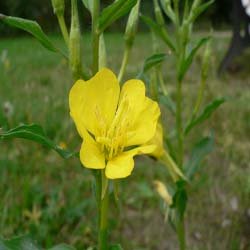|
Evening primrose oil
Introduction[Top] Evening primrose oil is also known as Oenothera biennis and EPO. It is a plant indigneous to North America. It also grows in Europe as well as the Southern Hemisphere. EPO contains (GLA) gamma-linolenic acid. It is a essential fatty acid, these are required development and growth in the body.The oil comes from the seeds.
What EPO is used for[Top] EPO has been used for eczema since the 1930's. The Native Americans consumed the boiled root and made leaf poultices from EPO for hemorrhoids and bruises. They also used it for flu, colds, arthritis, and asthma. In recent times, it has been employed for conditions involving inflammation, like rheumatoid arthritis. EPO is employed for conditions that affect women's health, like breast pain, premenstrual syndrome and menopausal symptoms. Other conditions EPO is used for include diabetes and cancer. How EPO is Used[Top] EPO is taken out from seeds of the plant. The oil is generally put into capsules. Science Says[Top] A study was done by M.G. Brush, M.D., of the department of gynecology at St. Thomas' Hospital Medical School in London. It involved sixty women aged between fourteen to fifty years of age. They suffered with bad PMS episodes, and failed to get relief from standard treatments. They took 500 mg capsules per day, starting from three days. Two 500-mg capsules daily, starting three days before expected beginning of the symptoms until the beginning of menstruation. Sixty two percent of the women had total relief from PMS symptoms. Twenty-two percent had partial relief. Slight or no change at all was seen sixteen percent. Brush said, "Excellent results were obtained with evening primrose oil for premenstrual breast discomfort, including some severe cases of fibrocystic breast disease." A controlled, double blind, crossover study, employed different amounts of EPO on ninety-nine atopic eczema patients. The study revealed major improvements with high doses as well as no side effects.
Side affects and cautions[Top] EPO is generally safe. Side effects are rarely reported, side effects include headache and gastrointestinal upset. Back to natural healing home page
|
Loading



